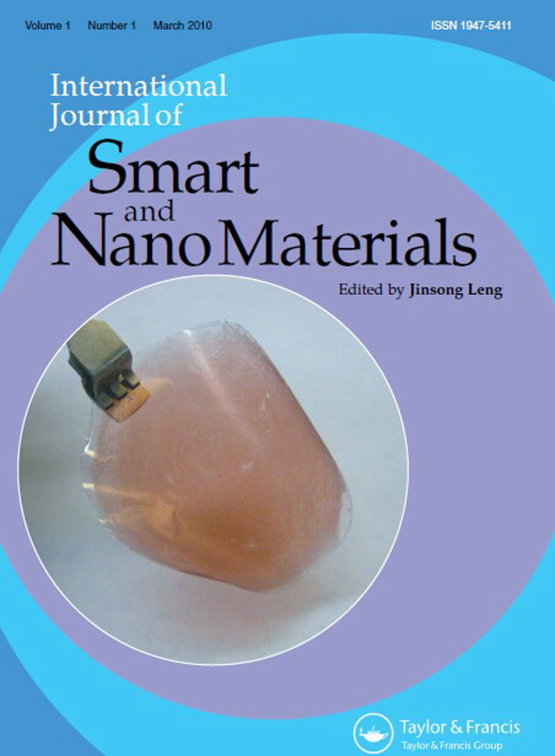Submit a Manuscript to the Journal
International Journal of Smart and Nano Materials
For an Article Collection on
Bioinspired Nanofluidic Iontronics
Manuscript deadline
30 April 2024


Article collection guest advisor(s)
Xu Hou,
College of Chemistry and Chemical Engineering and College of Physical Science and Technology, Xiamen University, China
[email protected]
Miao Wang,
College of Materials, Xiamen University, China
[email protected]
Yaqi Hou,
Institute of Flexible Electronics (IFE, Future Technologies), Xiamen University, China
[email protected]
Bioinspired Nanofluidic Iontronics
Nanofluidics derived from the development of bioinspired concepts have garnered significant attention in the past decade due to their distinctive characteristics and the ensuing state-of-the-art applications. These applications span various fields, including medical diagnostics, drug delivery, water purification and desalination, energy harvesting and storage, chemical and biosensing, lab-on-a-chip devices, artificial organs, and tissues. Especially, compared to the electronic systems, with ions acting as the charge carriers, nanofluidic iontronics exhibit greater stability in dynamic biological processes, and they can resist the noise caused by external electric or magnetic fields since ions have significantly higher mass than electrons. Furthermore, the diversity in ion types and chemical properties offers higher parallel computing capabilities. Therefore, developing bioinspired nanofluidic iontronic systems for brain-like computing could potentially open a new frontier in the era of “Intelligent Age”.
This special issue seeks to compile contributions that report the most recent advancements and address critical concerns pertaining to bioinspired nanofluidics and their burgeoning applications. The special issue invites ground-breaking and captivating original research, as well as reviews that explore emerging trends within this promising domain. Potential topics include, but are not limited to:
- Bioinspired nanofluidic systems
- Nanofluidic memristors
- Brain-like/neuromorphic computing
- Artificial synapse/brain
- Development of nanofluidic materials and devices
- Nano channels/pores-based sensors
- Nano filter and separators
- Energy harvesting and storage using nanofluidic devices
- Theoretical and computational modeling of nanofluidic systems
All manuscripts submitted to this Article Collection will undergo a full peer-review; the Guest Advisor for this collection will not be handling the manuscripts (unless they are an Editorial Board member). Please review the journal scope and author submission instructions prior to submitting a manuscript.
The deadline for submitting manuscripts is 1 November 2023.
Dr. Xu Hou is a professor of College of Chemistry and Chemical Engineering and College of Physical Science and Technology at Xiamen University. He is working on liquid-based materials, liquid gating technology, and bioinspired nanofluidic iontronics. Most notable among these is the original concept of "liquid gating technology", which takes liquid interface regulation as a breakthrough to improve the function, performance, and application of membrane materials. Professor Xu Hou has published Nature, Science, Nature Reviews Materials, National Science Review, Science Advances, Nature Communications, Proceedings of the National Academy of Sciences, etc. more than 100 SCl papers. He also serves as the director of Institute of Electrochemical Science and Engineering, the deputy director of State Key Laboratory of Physical Chemistry of Solid Surface.
Dr. Miao Wang is an assistant professor at the College of Materials at Xiamen University. She has systematically studied the ionic transport regulation in dynamically curved nanoconfinement, developed the large-scale and controllable fabrication and crack-free transfer methods for aligned nanochannels, and made great progress on the exploitations and applications of responsive dynamic nanochannel-based membrane materials and interfacial fluid transport control. She has published 53 SCI papers in the high impact journals including Nature, Advanced Materials, Joule, Journal of the American Chemical Society, etc. She also serves as a youth editor for Chinese Chemical Letters.
Dr. Yaqi Hou is an Assistant Professor of the Institute of Flexible Electronics (IFE, Future Technologies) at Xiamen University. She specializes in the cutting-edge field of bioinspired nanofluidic iontronics. Her current scientific interests encompass interfacial science in nanoconfinements and flexible iontronics for nerve monitoring and nerve communication. She has published 31 SCI papers in the high impact journals including Science, Nature, Nature Communications, etc.
Benefits of publishing open access within Taylor & Francis
Global marketing and publicity, ensuring your research reaches the people you want it to.
Article Collections bring together the latest research on hot topics from influential researchers across the globe.
Rigorous peer review for every open access article.
Rapid online publication allowing you to share your work quickly.
Looking to Publish your Research?
Find out how to publish your research open access with Taylor & Francis Group.
Choose open accessSubmission Instructions
All manuscripts submitted to this Article Collection will undergo desk assessment and peer-review as part of our standard editorial process. Guest Advisors for this collection will not be involved in peer-reviewing manuscripts unless they are an existing member of the Editorial Board. Please review the journal Aims and Scope and author submission instructions prior to submitting a manuscript.